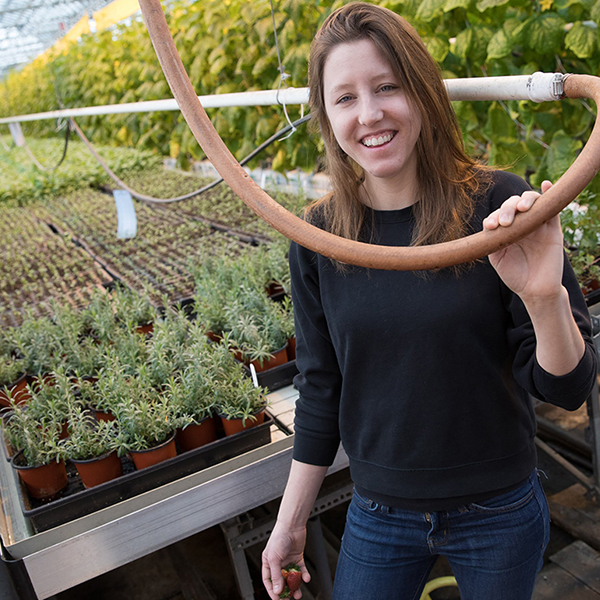How did Mohammed Ashour, MSc’11, MBA’19, go from studying neuroscience to leading an award-winning company that farms four billion crickets?
With his master’s degree in neuroscience in hand in 2011, Ashour returned to McGill the next fall for a joint MBA/MDCM. During the first few weeks of the MBA program, an email popped up in his inbox announcing the Hult Prize — an annual, year-long competition that challenges university-level students to solve a pressing social issue.
“It sounded super-fascinating,” says Ashour. “It was about building a business to address a major global challenge, and the challenge that year was hunger.” Each year’s theme is selected by former U.S. president Bill Clinton. The winning team goes home with a cheque for a cool million to help launch their own social enterprise. “It was very compelling,” says Ashour.
He set out to find his team. His first pick was Gabe Mott, MBA’14. They had met at student orientation, noting their shared motivation to create business careers with positive social benefits. “We both came in with this impact mindset,” says Ashour. “And that’s what really drove this.”
Ashour and Mott recruited the other team members from among their MBA cohort: Shobhita Soor, BSc’10, BCL/LLB’15, MBA’15, Jesse Pearlstein, MBA’14, and Zev Thompson, MBA’14. At the close of the year-long competition, the McGill team beat out more than 10,000 applicants to win the top prize in September 2013.
Flash forward almost 10 years and Aspire Food Group now runs a fully automated, 11-storey cricket production and processing facility in London, Ontario. Ashour is the CEO and Mott is the COO. Their vision? To be “one of the most formidable, sustainable and scalable protein production systems on the planet,” said Ashour in a February 2022 video from The New York Times.

Aspire’s website explains how their name came about: “We refuse to live in a world where food and nutrition insecurity abound, and we have the Audacity, Skills, Passion, Ingenuity, Rebelliousness and commitment to Excellence (ASPIRE) to do something about it.”
Over the years, the company has gone through several incarnations, from an R&D facility in Mexico to a pilot facility in Ghana that farmed palm larvae. Aspire Food Group Ghana spun off in 2020 and became Legendary Foods Africa, with Hult team member and Aspire co-founder Shobhita Soor, now serving as its CEO. Aspire also runs an R&D facility in Austin, Texas.
Located in an industrial park at the intersection of Concept and Innovation Drives, Aspire’s London facility opened in spring 2022 with the financial support of the Canadian government. At 150,000 square feet and 11 stories tall, Aspire’s vertical farming facility is expected to produce up to 12,000 metric tonnes of crickets each year.
In an op-ed in the November 2022 issue of Maclean’s, Ashour pointed out the significant environmental and economic benefits to farming crickets, as opposed to livestock: “The 12 acres that house Aspire would be enough to raise just six cows a year.”
An ancient food for a modern challenge
Okay, but why crickets?
Of the approximately one million insect species identified in the world, the Aspire team winnowed that down to those that are edible, that don’t transmit diseases, and that have good “organoleptic” properties (taste, texture, aroma). Above all, they looked for an insect that humans have already been consuming for thousands of years. “And that led us to crickets,” says Ashour, who was recently named to the Maclean’s Power List of 100 Canadians Shaping the Country in 2023.
Crickets are a source of protein, fat, vitamins, minerals, and fiber. All parts of a cricket are edible. In its marketing, Aspire describes the cricket as “an all-natural, sustainable, superfood ingredient, nutritionally on par with, or superior to, livestock, cell-cultured, and plant-based alternatives.”
But … what does a cricket taste like?
“It very much depends on how they’re prepared,” says Mott. Even though he’s vegetarian, he’s learned to appreciate insects, after many years of travel on behalf of Aspire. “Crickets, if you fry them, they can be crunchy and almondy. If you spray dry them, you get a subtle malty flavour.” His favourite was the cricket jerky prepared by a chef at their Austin facility. “They were chewy and had a really nice smoky flavour.”
Cooking insects is nothing new, even in North America. The Aspire team was profiled in a 2017 Fortune magazine article, when they collaborated with a San Francisco restaurant to incorporate crickets into its Michelin-starred menu. “The chef had our team finishing the crickets on mint and thyme and sage,” says Ashour. “From my perspective, crickets have a nutty, almost almond flavour and they have a crunch like popcorn.”
The joy of cooking crickets
Ashour notes there’s a large, untapped market for insect protein to be consumed as both human and pet food. Aspire commissioned a North America-wide survey in 2020. “The results were encouraging,” says Ashour. “We discovered that 40 to 50 per cent of consumers either already embrace the idea of insects as food or are persuadable.” He notes that’s a potential market of around 150 million consumers in the U.S. alone.
The study also concluded that, while crickets are “a little unusual” to our North American diet, they are “healthy, ethical, nutrient-packed, protein-dense, sustainable and flavorful.” There’s a lot of goodness packed into the tiny cricket.
And Aspire is farming four billion of them — including 95,000 bins each filled with 30,000 newly hatched crickets. All the food and water they need to thrive are provided courtesy of Aspire’s state-of-the-art technologies, which include artificial intelligence, robotics, and automated storage and retrieval.
Aspire’s deft approach to the use of technology was recognized in 2021 when the International Research Centre in Artificial Intelligence named a collaboration between Aspire and its partner DarwinAI as one of the top 10 outstanding projects leveraging AI to advance the UN’s Sustainable Development Goals.
Last year, Aspire signed a memorandum of understanding with Lotte Confectionary, an international company and a leader in Korea’s food industry, to act as an exclusive partner to market, distribute and sell their products in Asia and Europe.
“We’re scaling it up,” says Mott, who notes they are now producing more crickets in one month than in the entire history of the company. “This is a period of intense learning for us, as we develop more granular knowledge to generate the most healthy, happy, and nutritious crickets that we can.”
Another country, a different challenge
Shobhita Soor spends her days thinking not about crickets, but palm larvae. As CEO of Aspire’s spin-off company, Legendary Foods Africa, she manages a palm larva farming facility in Kumasi, Ghana.
Soor notes that most African countries are still net importers of food, and she also sees a growing trend toward pre-packaged, shelf-stable products that are not necessarily high-quality. “How do we deliver high nutrition in a convenient format?”
Palm larvae are a traditional food in west and central Africa. They provide protein, good fats, zinc, B vitamins, iron, magnesium, and calcium. Soor describes the taste as like shrimp, with the texture of sausage. She notes that for North Americans, the “gateway” to consuming palm larvae is Legendary Food’s kebab product. “It’s like grilled spicy meat.”
A priority for the company is “modernizing the application of palm larvae as an ingredient,” says Soor. So, they produce biscuits, sauces, condiments, and protein powders using palm larvae ingredients. The company also aims to be a supplier to other food and beverage manufacturers, which currently rely on imported ingredients.
Legendary Foods has attracted investors like Baylis Emerging Markets and the Nairobi Business Angel Network. “We’re in a high-growth phase,” says Soor. “Insect agriculture becomes really interesting because we can deliver the nutrition of meat, but in a way that’s sustainable and at a price that’s extremely cost-effective.”
More food for thought
Soor describes her team’s approach as “conscious agri-processing — we want to be a leading food and beverage manufacturer that’s sustainable, that’s great for the environment, and also great for the people producing the product as well as those we’re sourcing from.”
Thinking back on her time at McGill, Soor recalls that was when her worldview began to take shape. “It opened up this world for me around what does conscious capitalism look like? I wanted to prove that you could still do good and make money.”
Soor credits the global McGill community with supporting that journey, both with Aspire Food Group and Legendary Foods Africa. In fact, the team originally chose Ghana thanks to a McGill connection. William Otoo Ellis, PhD’93, then-vice chancellor of the Kwame Nkrumah University of Science and Technology, helped the team set up their first research facility in Ghana, after their Hult Prize win.
“I feel really lucky to have gone to McGill,” says Soor, “and to have the opportunity to do this really cool and impactful work — to build something that has never been built before.”


